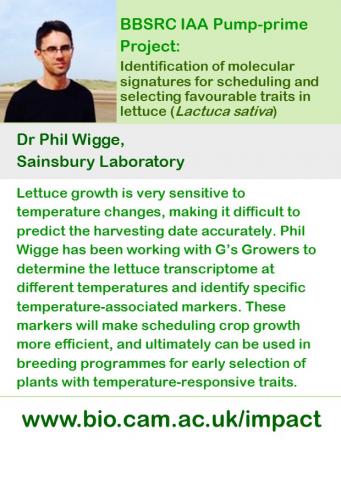|
|
|
Lettuce growth is very sensitive to temperature change, and as a result farmers are required to overplant the crop by up to 15% in order to ensure the yield will be able to meet demand. Currently there are also no techniques growers can use to predict accurately when lettuces will mature, making the harvesting stage inefficient as well. A better understanding of lettuce biology could lead to improved efficiency in lettuce farming and a reduction in waste.
Dr Phil Wigge from the Sainsbury Laboratory has teamed up with G’s Growers Ltd to study lettuce growth, and to determine how gene expression in lettuce changes in relation to temperature. “Lettuce was a good choice for us both as G’s is the largest lettuce producer in the UK, and we have plenty of resources for working with lettuce in a scientific setting,” explains Phil.
The BBSRC Impact Acceleration Account pump-prime funding has enabled Phil to have a summer student, Chloe Casey, work on the project with him. “Chloe is growing lettuces in the lab at a range of temperatures, and then we’re extracting the RNA to measure gene expression at different temperatures – the ‘transcriptome’,” says Phil. He hopes they will be able to use this information to determine when lettuces will be ready for harvesting and understand how lettuces are affected by warm or cold temperatures.
“The plan is to turn this information into a diagnostic tool, where farmers can take a small lettuce sample and use the identified molecular markers to forecast harvesting time accurately.”
Characterising the response of lettuce to different temperatures and the genes involved will also inform breeding programmes. “Many seedlings are lost at the planting stage due to their inappropriate response to warmer temperatures,” explains Phil. “We hope these markers can be used to select plants at the seedling stage that have improved temperature traits.”
Long term, Phil hopes that the diagnostic tool combined with the knowledge gained from the project will be used to improve farming practices, making lettuce production easier and more efficient.
“It’s been a very exciting collaboration between our basic research lab and a commercial lettuce grower in the UK.”


